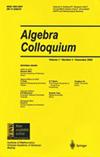On Ordinary Words of Standard Reed–Solomon Codes over Finite Fields
IF 0.4
4区 数学
Q4 MATHEMATICS
引用次数: 0
Abstract
Reed–Solomon codes are widely used to establish a reliable channel to transmit information in digital communication which has a strong error correction capability and a variety of efficient decoding algorithm. Usually we use the maximum likelihood decoding (MLD) algorithm in the decoding process of Reed–Solomon codes. MLD algorithm relies on determining the error distance of received word. Dür, Guruswami, Wan, Li, Hong, Wu, Yue and Zhu et al. got some results on the error distance. For the Reed–Solomon code [Formula: see text], the received word [Formula: see text] is called an ordinary word of [Formula: see text] if the error distance [Formula: see text] with [Formula: see text] being the Lagrange interpolation polynomial of [Formula: see text]. We introduce a new method of studying the ordinary words. In fact, we make use of the result obtained by Y.C. Xu and S.F. Hong on the decomposition of certain polynomials over the finite field to determine all the ordinary words of the standard Reed–Solomon codes over the finite field of [Formula: see text] elements. This completely answers an open problem raised by Li and Wan in [On the subset sum problem over finite fields, Finite Fields Appl. 14 (2008) 911–929].有限域上标准Reed-Solomon码的常用词
里德-所罗门码在数字通信中被广泛用于建立可靠的信息传输通道,它具有强大的纠错能力和多种高效的译码算法。在里德-所罗门码的译码过程中,通常采用最大似然译码算法。MLD算法依赖于确定接收字的错误距离。d r、Guruswami、Wan、Li、Hong、Wu、Yue和Zhu等人在误差距离上得到了一些结果。对于Reed-Solomon码[公式:见文],如果[公式:见文]与[公式:见文]的误差距离[公式:见文]为[公式:见文]的拉格朗日插值多项式,则接收到的[公式:见文]字称为[公式:见文]的普通字。我们介绍了一种学习常用词的新方法。实际上,我们利用Xu Y.C.和Hong s.f.f关于有限域上多项式分解的结果,确定了[公式:见文]元有限域上标准Reed-Solomon码的所有普通字。这完全回答了Li和Wan在[关于有限域上的子集和问题,有限域应用,14(2008)911-929]中提出的一个开放问题。
本文章由计算机程序翻译,如有差异,请以英文原文为准。
求助全文
约1分钟内获得全文
求助全文
来源期刊

Algebra Colloquium
数学-数学
CiteScore
0.60
自引率
0.00%
发文量
625
审稿时长
15.6 months
期刊介绍:
Algebra Colloquium is an international mathematical journal founded at the beginning of 1994. It is edited by the Academy of Mathematics & Systems Science, Chinese Academy of Sciences, jointly with Suzhou University, and published quarterly in English in every March, June, September and December. Algebra Colloquium carries original research articles of high level in the field of pure and applied algebra. Papers from related areas which have applications to algebra are also considered for publication. This journal aims to reflect the latest developments in algebra and promote international academic exchanges.
 求助内容:
求助内容: 应助结果提醒方式:
应助结果提醒方式:


